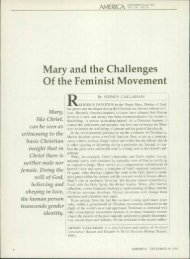You also want an ePaper? Increase the reach of your titles
YUMPU automatically turns print PDFs into web optimized ePapers that Google loves.
THE WORD<br />
God’s Favorites<br />
SIXTH SUNDAY OF EASTER (B), MAY 17, 2009<br />
Readings: Acts 10:25-26, 34-35, 44-48; Ps 98:1-4; 1 Jn 4:7-10; Jn 15:9-17<br />
“No one has greater love than this, to lay down one’s life for one’s<br />
friends” (Jn 15:13)<br />
As a youngster I had two best<br />
friends, which is why it troubled<br />
me when others would<br />
ask me who was my best friend. I<br />
knew there was supposed to be only<br />
one, but I had two, and I loved them<br />
both equally. Today’s readings speak of<br />
how God befriends humanity and<br />
shows no partiality.<br />
In the verses previous to today’s<br />
reading from Acts, Peter struggles<br />
with this new insight. Three times<br />
God speaks to him in a vision, so that<br />
he is able to say to Cornelius, “In<br />
truth, I see that God shows no partiality.”<br />
Peter recognizes that in every<br />
nation, whoever fears God and acts<br />
uprightly is acceptable to God. The<br />
“fear” about which Peter speaks is not<br />
cowering or cringing before God, who<br />
has the power to crush you. Rather, it<br />
is becoming enraptured with awe at<br />
the Holy One whose immense love is<br />
beyond comprehension and then responding<br />
by acting “uprightly,” that is,<br />
in right relation toward all: God, self,<br />
others and all that is created.<br />
Even as Peter is speaking and still<br />
trying to grasp the implications of all<br />
this, the Holy Spirit pre-empts any<br />
further attempts at explanation, and in<br />
the divine erratic, inexplicable way,<br />
falls upon all without distinction. As<br />
Peter rightly asserts, those who consider<br />
themselves already to be God’s<br />
BARBARA E. REID, O.P., is a professor of New<br />
Testament studies at Catholic Theological<br />
Union in Chicago, Ill.<br />
best friends must try not to put any<br />
obstacles in the way of the new best<br />
friends upon whom the Spirit falls.<br />
Like a parent who loves each child<br />
differently yet equally, so is the<br />
divine embrace.<br />
The Gospel is a continuation<br />
of the Last Discourse of<br />
Jesus to his disciples. The<br />
Fourth Evangelist uses the<br />
term “disciple” more than 70<br />
times to refer to all the women<br />
and men who believed in and<br />
followed Jesus. There is no scene in<br />
this Gospel of choosing or sending the<br />
Twelve, nor do the Twelve figure in<br />
any prominent way in the narrative.<br />
They are mentioned only in passing at<br />
6:67, 70 and 20:24.<br />
In today’s Gospel reading, Jesus<br />
speaks of having chosen and befriended<br />
all who have remained with him.<br />
The offer of friendship to disciples is<br />
part of a chain of love that begins with<br />
the Father, whose love is poured out in<br />
the self-gift that is Jesus, who offers<br />
friendship to all.<br />
Jesus then tells his friends how to<br />
keep that chain unbroken: pay the love<br />
forward to others, befriending them in<br />
the way that he has done for them. He<br />
speaks of this as a “commandment,”<br />
which seems an odd term in this context.<br />
How can one be commanded to<br />
“love” another person? In biblical parlance,<br />
“love” signifies not so much the<br />
feelings one has toward another.<br />
Rather, it designates deeds of loving<br />
kindness toward another that communicate<br />
to that one that he or she is part<br />
of the community of chosen friends of<br />
God and Jesus. We are commanded to<br />
act this way toward others, no matter<br />
how we might feel about them and<br />
whether or not they reciprocate the<br />
love offered.<br />
Jesus demonstrated what such love<br />
entails when he washed the feet of all<br />
“his own” (13:1), the many beloved<br />
friends gathered for their final meal<br />
with him. He did not skip Peter and<br />
Judas. He explains this as the<br />
greatest kind of love: the willingness<br />
to lay down one’s life for<br />
one’s friends. This is not an<br />
obligatory service, such as a<br />
slave is bound to render.<br />
Rather, the love of friendship is<br />
freely chosen self-surrender. The<br />
most challenging aspect of this<br />
love is that the friends of Jesus<br />
PRAYING WITH SCRIPTURE<br />
• Spend some time with Jesus, your best<br />
friend. Let his love and joy abide in you.<br />
• Ask God for the grace to love those you find<br />
most difficult to befriend and love.<br />
• Savor with Jesus the joy you experience in<br />
choosing to surrender yourself in love to<br />
another.<br />
are asked not only to embrace within<br />
the community of beloved disciples all<br />
those whom Jesus befriends, especially<br />
those to whom we are not naturally<br />
drawn, but even to be willing to risk<br />
our own lives for such people. When<br />
this seems a humanly impossible<br />
choice, Jesus assures disciples that<br />
when they ask God in his name, the<br />
necessary grace will be given.<br />
Abiding with Christ in communion<br />
with all his best friends brings<br />
an inner joy that is full to brimming<br />
over (15:11).<br />
BARBARA E. REID<br />
ART: TAD DUNNE<br />
38 <strong>America</strong> May 11, 2009









